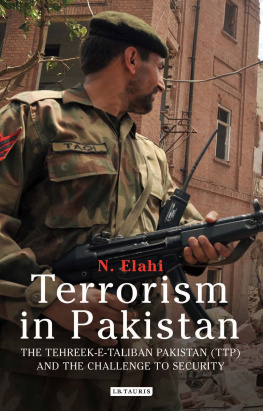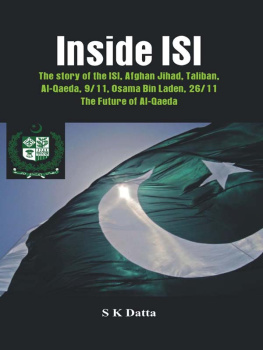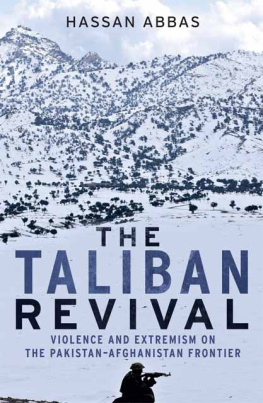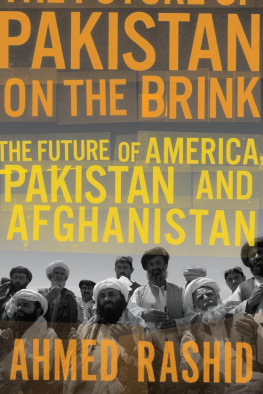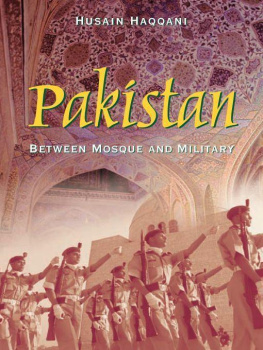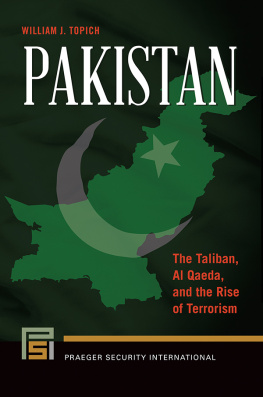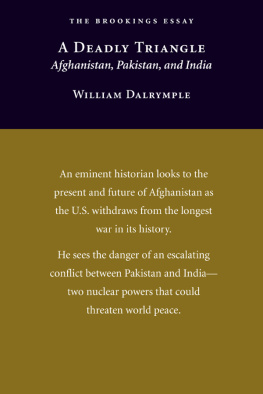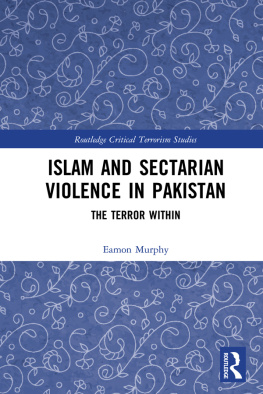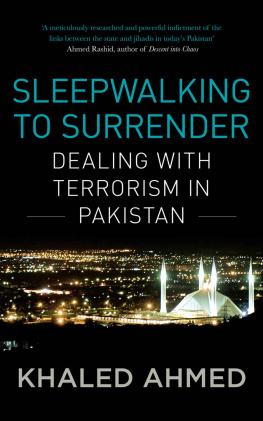
N. Elahi is Honorary Director of the Centre for Peace and Security Studies at the University of the Punjab. He holds a PhD from the University of the Punjab and an MA in Intelligence and International Security from King's College London.

Published in 2019 by
I.B.Tauris & Co. Ltd
London New York
www.ibtauris.com
Copyright 2019 N. Elahi
The right N. Elahi to be identified as the author of this work has been asserted
by the author in accordance with the Copyright, Designs and Patents Act 1988.
All rights reserved. Except for brief quotations in a review, this book, or any part
thereof, may not be reproduced, stored in or introduced into a retrieval system, or
transmitted, in any form or by any means, electronic, mechanical, photocopying,
recording or otherwise, without the prior written permission of the publisher.
Every attempt has been made to gain permission for the use of the images
in this book. Any omissions will be rectified in future editions.
References to websites were correct at the time of writing.
International Library of Twentieth Century History 127
ISBN (HB): 978 1 78453 999 3
ISBN (PB): 978 1 83860 376 2
eISBN: 978 1 78672 266 9
ePDF: 978 1 78673 266 8
A full CIP record for this book is available from the British Library
A full CIP record is available from the Library of Congress
Library of Congress Catalog Card Number: available
CONTENTS
LIST OF ILLUSTRATIONS
Map
Taliban-controlled areas in Afghanistan.
Figures
Trends of sectarian violence (200912).
An eight-arrow scenario.
Situation, progression and impact.
Tables
Details of shrines/madaris bombed by terrorists in KP.
Details of the killing of Sunni Ulema linked with various shrines in KP.
Suicide attacks, deaths and injuries from 2002 to 2017.
Fatalities in terrorist violence in Pakistan from 2003 to 2018.
Military operations and peace deals.
SWOT analysis of the situation.
Drone attacks in Pakistan: 200515.
Estimated losses during 200115.
ABBREVIATIONS
| ANP | Awami National Party |
| CID | Criminal Investigation Department |
| CTD | Counter Terrorism Department |
| FATA | Federally Administered Tribal Areas |
| FC | Frontier Corps |
| FCR | Frontier Crimes Regulation |
| FIA | Federal Investigation Agency |
| GoP | Government of Pakistan |
| HuJI | Harkat-ul-Jihad-al-Islami |
| HuM | Harkat-ul-Mujahideen |
| IB | Intelligence Bureau |
| IDPs | Internally Displaced Persons |
| IED | Improvised Explosive Device |
| ISI | Inter-Services Intelligence |
| JeM | Jaish-e-Muhammad |
| JI | Jamaat-e-Islami |
| JuD | Jamaat-ud-Dawa |
| JUI | Jamiat Ulema-e Islam |
| KP | Khyber Pakhtunkhwa (formerly NWFP) |
| LeJ | Lashkar-e-Jhangvi |
| LeT | Lashkar-e-Taiba |
| MI | Military Intelligence |
| MMA | Muttahida Majlis-e-Amal |
| MNA | Member of National Assembly |
| NATO | North Atlantic Treaty Organization |
| NCMC | National Crisis Management Cell (works under Pakistan's Ministry of Interior) |
| NGO | Non-Governmental Organization |
| NW | North Waziristan |
| NWFP | North-West Frontier Province (now KP Khyber Pakhtunkhwa) |
| PA | Political Agent |
| PATA | Provincially Administered Tribal Areas |
| PML | Pakistan Muslim League |
| PML (N) | Pakistan Muslim League (Nawaz) (political party led by Nawaz Sharif) |
| PPP | Pakistan Peoples Party |
| PT | Punjabi Taliban |
| PTI | Pakistan Tehreek-e-Insaf (political party headed by Imran Khan) |
| SFs | Security Forces |
| SWA | South Waziristan Agency |
| TNSM | Tehreek-e-Nifaz-e-Shariat-e-Mohammadi |
| TTP | Tehreek-e-Taliban Pakistan (Movement of the Taliban in Pakistan) |
| VBIED | Vehicle-Borne Improvised Explosive Device |
FOREWORD
It is my great pleasure to preface this book by N. Elahi, an old and valued friend, whose insights have helped me considerably to shape my perceptions of Pakistan. Mr Elahi has been closely observing Pakistan's struggle against terrorism for the past 15 years, with profound insights into the conduct and structures of the counter-terrorism campaign. This book is therefore not only a work of analysis, but also an important historical document in its own right.
Mr Elahi gives a vivid picture of the well-known struggle of Pakistan against terrorism. Furthermore, this book is highly objective and unbiased. Previously there has been both Pakistani and Western commentators engaging in hysterical denunciations and wild conspiracy theories.
One of the valuable features of this book is that it is eminently sensible in its treatment of foreign involvement in the Tehreek-e-Taliban rebellion. It not only draws attention to the alleged role of the Afghan and Indian intelligence services in sheltering the Tehreek-e-Taliban Pakistan (TTP) remnants who took refuge in Afghanistan and from there have continued their attacks on Pakistan, but also makes it clear that the origin, leadership and membership of the TTP have been tragically Pakistani. Mr Elahi rightly attributes the explosion of Pakistani militancy after 2001 to the side-effects of the US invasion of Afghanistan, as well as draws attention to the roots of the TTP rebellion in local traditions and resentments, and to the breakdown of the former indirect system of rule in Federally Administered Tribal Areas (FATA).
Mr Elahi is both clear-sighted and sympathetic (a rare combination) in his portrayal of why so many Pakistanis including Pakistani journalists found this very difficult to accept, and the effects of this non-acceptance of reality had prevailed for several years, leading to the willingness of the Pakistani population to support a tough campaign against the militants. This also led to the repeated attempts by the military and politicians to make peace deals with the TTP, the futility of which is cleverly dissected in this book.
As Mr Elahi writes, however, in early 2009, when the Pakistani security establishment recognised the TTP as a real threat to Pakistan's interests and even its survival as a state (as opposed to the misguided products of legitimate anti-American feelings), they successfully launched a series of operations against the militants to rally public opinion in support of these campaigns over time. Consequently, the Pakistani state and military were greatly helped by the atrocities committed by the TTP against Pakistanis, culminating in the massacre of schoolchildren in Peshawar. Eventually, it simply became impossible not to attribute these crimes to the TTP and its leadership.
This book brings out two more things that are important for both Pakistani and foreign observers to recognise. The first is that in the fight against the TTP insurgency, Pakistan had for a while, and hopefully forever won. This is despite what Mr Elahi says have been the often appalling failures of the Pakistani state and military response, especially regarding the development of a coherent, comprehensive counter-terrorism strategy as well as steady, institutionalised cooperation between Pakistan's disparate and often feuding security institutions.
Next page
